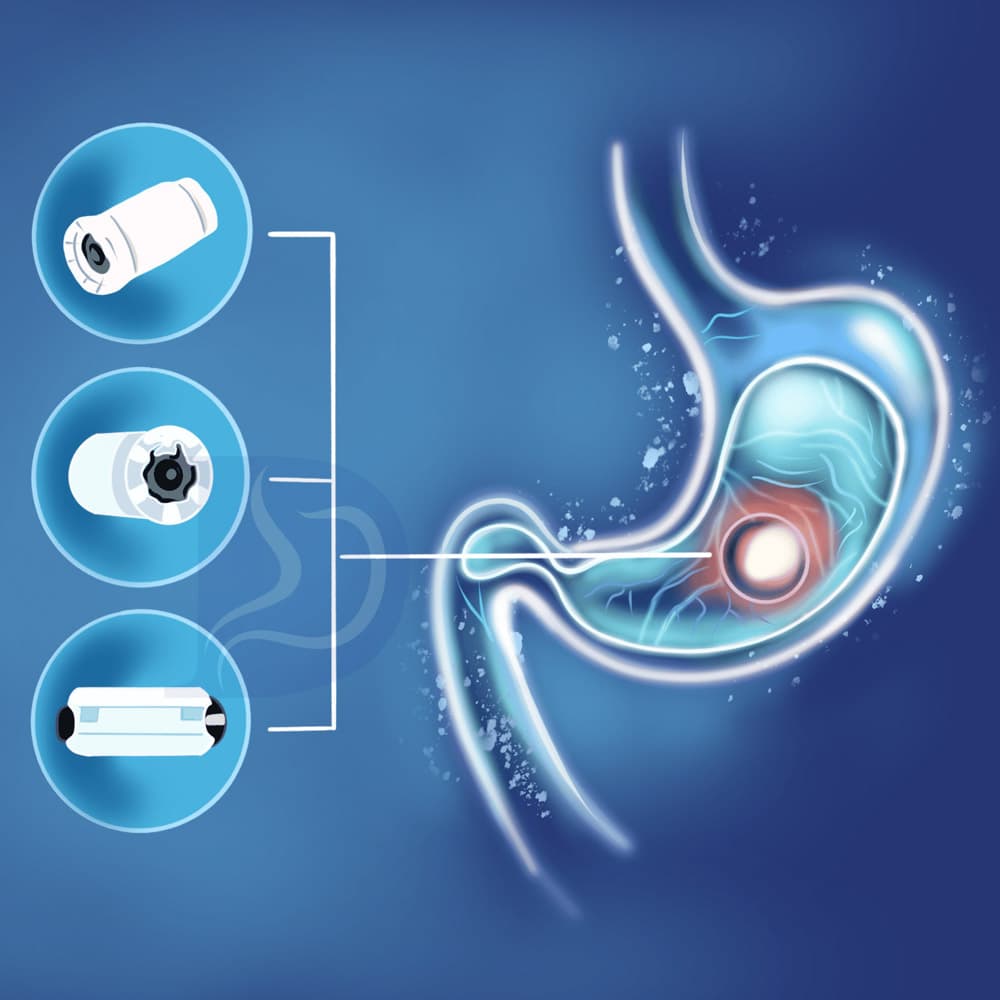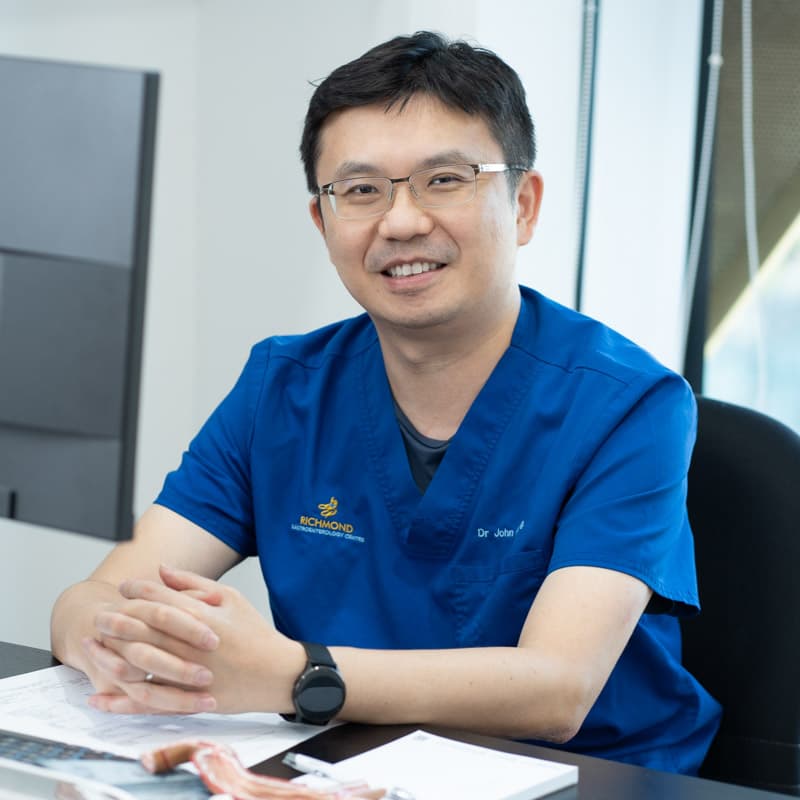Capsule Endoscopy
Capsule endoscopy is a diagnostic procedure used to examine the small intestine, which is not easily accessible with conventional endoscopy or colonoscopy. It is commonly used to investigate symptoms such as gastrointestinal bleeding, unexplained anemia, chronic abdominal pain or suspected conditions like Crohn’s disease.
Richmond Gastroenterology Centre
Dr. John Hsiang
MBChB (NZ), FRACP (Australasia), MD (Doctorate), FRCP (Edinburgh), FAMS (Gastro)
Dr. John Hsiang is a distinguished gastroenterologist in Singapore with extensive training and experience in digestive health. He obtained his Fellowship of the Royal Australasian College of Physicians in Gastroenterology in 2012 and holds a PhD in viral hepatitis and fatty liver disease research.
He provides care for a broad range of digestive and liver concerns, combining thorough evaluation with tailored management to support patients’ long-term well-being.
Dr Hsiang is skilled in performing gastroscopy (upper endoscopy) and colonoscopy to investigate symptoms, detect stomach and colon cancers at an early stage, and provide timely treatment options.
With a commitment to individualised care, he applies an evidence-based approach that prioritises accuracy, effectiveness and patient comfort at every stage of diagnosis and treatment.
Languages Spoken:
English, Mandarin and Hokkien
Fellowship Trained Specialist
20+ Years of Clinical Experience

What is Capsule Endoscopy?
Capsule endoscopy, also known as a “pill camera”, is a diagnostic test used to examine the small intestine. It involves swallowing a vitamin-sized capsule containing a tiny camera, light source and transmitter.
As the capsule moves through your digestive tract, it captures thousands of images, which are sent to a recorder worn on your body:
This allows your doctor to assess areas of the small intestine that are difficult to reach with standard endoscopy or colonoscopy, helping to diagnose conditions such as bleeding, Crohn’s disease or small bowel tumours.
Preparing for and Undergoing Capsule Endoscopy
Before the Procedure
- You will be advised to fast for at least 6–8 hours before the test (usually overnight).
- Inform your doctor of any medical conditions, including swallowing disorders or previous abdominal surgery.
- Certain medications may need to be adjusted or paused as instructed.
- You may be asked to avoid iron supplements or high-fibre foods the day before.
- A laxative may be prescribed to improve image clarity (in some cases).
During the Procedure
- The capsule passes naturally through your digestive tract, taking images of the small intestine.
- You will wear a data recorder on your waist or shoulder to capture images throughout the day.
- You can go about light daily activities, but avoid vigorous movement or bending forward.
- Do not eat or drink for 2 hours after swallowing the capsule; a light meal may be allowed after 4 hours.
After the Procedure
- The capsule is disposable and passes naturally in your stool within 1–2 days.
- You do not need to retrieve the capsule.
- The data recorder will be returned to the clinic for image analysis.
- You may resume normal activities unless instructed otherwise.
- Your doctor will review the results and discuss the next steps at a follow-up appointment.
When is a Capsule Endoscopy Recommended?
Capsule endoscopy is a valuable tool for evaluating the small intestine, particularly when other tests such as gastroscopy and colonoscopy have not provided answers.
Your doctor may recommend it for the following indications:
Obscure Gastrointestinal Bleeding
To identify the source of bleeding when initial endoscopic procedures are inconclusive. This may present as unexplained anaemia or blood in the stool.
Suspected Crohn’s Disease
To detect inflammation and assess the extent of small bowel involvement in Crohn’s disease.
Unexplained Abdominal Pain
To evaluate persistent or unclear causes of abdominal discomfort when other investigations are inconclusive.
Suspected Small Bowel Tumours
To detect benign or malignant growths that may be missed by standard imaging or endoscopy.
Celiac Disease
In selected cases, to assess the degree of mucosal damage or evaluate non-responsive coeliac disease.
Polyposis Syndromes
To screen for small bowel polyps in individuals with inherited conditions such as Peutz-Jeghers syndrome.
Is Capsule Endoscopy Safe?

Capsule endoscopy is a safe, well-tolerated procedure that does not require sedation or involve the risks of invasive endoscopy.
The main risk, though uncommon, is capsule retention in a narrowed part of the intestine (a stricture). To reduce this risk, your gastro specialist will review your medical history:
If a stricture is suspected, a dissolvable Patency Capsule may be used first to ensure the passage is clear.
Your Capsule Endoscopy Appointment: From Start to Finish

Make an Appointment
Pre-Procedure Consultation
Undergoing the Procedure
Post-Procedure Follow-Up
Patient Information
Is capsule endoscopy painful?
No. The procedure is painless. You are unlikely to feel the capsule as it moves through your digestive system
How big is the capsule?
The capsule is about the size of a large vitamin pill and is designed to be easy to swallow.
Will I require surgery?How long does the recording take?
The capsule typically records for 8 to 12 hours while you go about your day. During this time, you’ll wear a data recorder to collect the images.
Do I need someone to accompany me?
You don’t have to. Since sedation is not used, you can come to the clinic and return home on your own. Most patients are able to continue light activities during the recording period.
What happens to the capsule after the procedure?
The capsule is single-use and will pass naturally in your stool, usually within one to two days. It does not need to be retrieved and can be safely flushed.
When will I receive my results?
Your specialist will review the images in detail. A full report is usually ready within a week, and a follow-up appointment will be scheduled to discuss the findings.
Consult Our Specialist










